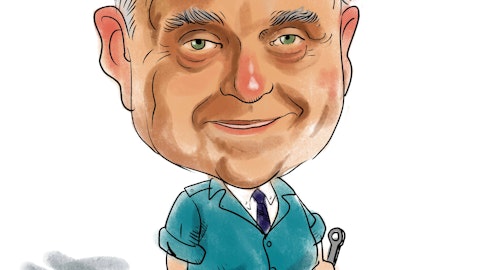Sony drags down Loeb’s October returns (NYPost)
Hedgie Dan Loeb’s long winning streak continued in October — although a 20 percent drop in his high-profile activist target Sony Corporation (ADR) (NYSE:SNE) nearly wiped out his overall gain. Loeb’s Third Point hedge fund ended the month with a 1.2 percent gain, lagging the S&P 500’s 4.6 percent return. He is still up 19.4 percent for the year, according to a report to investors, a copy of which was reviewed by The Post. Although his 2013 gain trails the S&P’s 25.3 percent year-to-date gain, Loeb’s fund this year remains one of the industry’s top performers.

Capital introduction favours large hedge funds (Risk)
The role of capital introduction has changed significantly, pushing up barriers for emerging managers. In an increasingly institutional world where the fight for every dollar of new capital is tougher than ever, hedge funds, the prime brokers who dominate the ‘cap intro’ space and institutional buyers are all attaching more value to the intelligence, rather than the pure introductions, that cap intro teams provide. The result is a shifting focus in the cap intro process away from helping establish emerging managers towards favouring larger funds. Nowhere is this more prevalent than Europe, where it should also be noted that lack of clarity surrounding the alternative investment fund managers directive (AIFMD) leaves questions unanswered about how and whether capital introduction will be able to function in the future.
Pershing enhances PrimeConnect collateral management application (HedgeWeek)
The new connection to Pershing’s Fully Paid Securities Lending programme allows hedge funds, through a fully automated solution, to transfer fully paid securities from BNY Mellon to Pershing, at which point the securities are available to be borrowed by Pershing. It also allows hedge fund managers to be able see the earning potential for fully paid assets in the Prime Services dashboard on NetX360, Pershing’s technology platform.
Quant funds suffer dismal ‘QE’ losing streak (FT)
How does a hedge fund react to losing a quarter of its investors’ money in a matter of months? Double-up? Blow up? Or buy Lego and wait? Cantab Capital, a multibillion-dollar quant hedge fund, run by computers (or rather, run by maths geeks who run computers) went for option three. The irreverent – and until this year, highly profitable – Cambridge-based firm, set up by Goldman Sachs Group, Inc. (NYSE:GS)’ former head of quantitative trading, spent £2,000 on Lego to boost staff morale this summer after a painful losing streak struck hundreds of millions off its trading portfolio’s value.
Swiss fund Gottex enters China with VStone in Asia push (Reuters)
Swiss fund-of-hedge-funds manager Gottex will form a joint venture with China’s VStone Asset Management, to further its aim to invest in Asia and raise capital from the region. Founded in 2008 by Dr Jiwu Chen, a former chief investment officer at Fullgoal Fund Management and China Life, VStone will help Gottex establish a foothold in Asia’s biggest economy and help its global clients get access to China investments. “The objective is to build out Gottex capability in China and to be able to provide our investors access to China’s onshore markets across equity, fixed income and private equity,” Gottex co-founder Max Gottschalk told Reuters.
Greenwich Global Hedge Fund Index up 1.86%, 7.36% YTD (Opalesque)
Stronger equity market performance in October helped the Greenwich Global Hedge Fund index increase 1.86% for October 2013. Despite an early market selloff due mostly to the US debt concerns, the resolution of the Government Debt Crisis and continued bond buying by the FED helped the S&P 500 increase +4.46% hitting a new closing high of 1757 at month end. Long-Short Equity was the best performing strategy in October up 2.18% closely followed by Multi-Strategy up 2.00%. All eight major hedge fund strategies ended October firmly in positive territory. Futures funds had their first good month of the year adding 1.90% in October to bring their year-to-date return to -1.69%.
Why Mark Fisher wants to buy oil (CNBC)
Hedge fund’s little piece of Paradise up by third (MacauBusinessDaily)
A New York-based hedge fund has invested approximately HK$77.60 million (US$10 million) in Paradise Entertainment Ltd. Paradise, chaired by Macau businessman Jay Chun, is the parent of casino electronic table games maker LT Game Ltd. Paradise shares jumped 13.01 percent yesterday in Hong Kong to close at HK$3.04. That was a 32 percent premium to the HK$2.30 per share paid by the hedge fund business – Bridger Management LLC – for its stake. The latter number was mentioned in a Hong Kong filing before the start of trading yesterday.
Kimberly Mounts, ‘Rising Star’ Hedge Fund Adviser, Dies at 48 (SFGate)
Kimberly Mounts, named a hedge fund “rising star” by Institutional Investor magazine in 2012 for her stewardship of MAP Alternative Asset Management Co. in Newport Beach, California, has died. She was 48. She died of cardiac arrest on Oct. 25 at Hoag Hospital in Newport Beach, according to her brother, Scott Mounts. She had been in a drug-induced coma since Oct. 20, when she first went into cardiac arrest following a workout at her gym, her brother said. “She was a vegetarian, didn’t drink, didn’t smoke and worked out religiously,” he said yesterday in a telephone interview.
Fortress is in talks to seed spinoff fund (CrainsNewYork)
Adam Levinson, chief investment officer of Fortress Investment Group LLC (NYSE:FIG)‘s Asia Macro funds, is in talks with the $58 billion alternative-asset manager about starting his own hedge-fund firm, according to one person familiar with the matter. No decision has been made and a possible spinoff may not take place until early 2015, said the person, who asked not to be identified because the information is private. Fortress would probably own a portion of the firm and provide back-office support and research, according to the person. Gordon Runte, a spokesman for New York-based Fortress, declined to comment on the discussions, as did Mr. Levinson.
Seth Klarman Amasses a Third of Drug Company, George Soros Adds Mercury Systems (Nasdaq)
Two well-known gurus, George Soros and Seth Klarman , bought additional shares of companies of which they own more than 5%, according to GuruFocus Real Time Picks. Klarman, leader of the Baupost Group, added shares to his position in Idenix Pharmaceuticals Inc (NASDAQ:IDIX), and Soros grew his position in Mercury Systems Inc (NASDAQ:MRCY). …Klarman raised his stake in Cambridge, Mass.-based Idenix Pharmaceuticals by 37.9% to a massive 36,910,868 shares in aggregate, giving him 27.55% ownership of the company, up from 19.98% a second quarter end. He bought the shares in a series of transactions taking place from Sept. 13 to Nov. 1, at per-share prices ranging from $3.56 to $4.85.
What Apple Needs: More Product Diversity (BusinessInsider)
I’ve be doing a lot of work on Apple Inc. (NASDAQ:AAPL), including providing some analysis to other sites such as CMSwire.com, where you can check out my latest anaylsis of Wall Street’s reaction to Apple’s new product announcements here. But there’s lots of things going on with Apple, and of course there is the nonstop chattering of pundits about what they will do next. And with Carl Icahn getting a lot more involved — he tweeted today that he has sent another letter to Apple CEO Tim Cook — one could see the “vaunted” catalyst that might moving Apple stock higher again. It seems as if the company is at a key point in it’s history. Will it move forward or start to stagnate as it hits a new product slump? Investors are certainly looking for new spark.
Nouriel Roubini | Bubbles in the broth (LiveMint)
As below-trend gross domestic product growth and high unemployment continue to afflict most advanced economies, their central banks have resorted to increasingly unconventional monetary policy. An alphabet soup of measures has been served up: ZIRP (zero-interest rate policy); QE (quantitative easing, or purchases of government bonds to reduce long-term rates when short-term policy rates are zero); CE (credit easing, or purchases of private assets aimed at lowering the private sector’s cost of capital); and FG (forward guidance, or the commitment to maintain QE or ZIRP until, say, the unemployment rate reaches a certain target). Some have gone as far as proposing NIPR (negative interest rate policy).
Recommended Reading:
Leon Cooperman Discloses 6.9% Stake in Delia’s
Lansdowne Partners Raises Position in LSE-listed Breedon Aggregates to 3.8%





